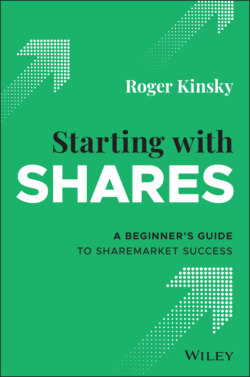Читать книгу Starting With Shares - Roger Kinsky - Страница 43
Key takeaways
ОглавлениеShares are units of ownership in a company and the number of shares you own determines the extent of your ownership. Shares are also known as equities and stocks.
Shares are a financial security because they have a tradeable value.
Shareholders are entitled to share in the assets and profits of the business they own shares in and to have a say in the running of the company. Shareholders can vote at AGMs (annual general meetings) and post questions.
The main reason a business wants to go public and issue shares is so it can raise a substantial amount of money — known as equity capital.
The other way a business can raise money is by loan capital — that is, by means of a business loan.
The great advantage for a company of equity capital is that no interest or loan repayments are required.
A shareholder can benefit if the business has some loan capital and can use it to make a higher profit than the interest cost of the loan. However, too much loan capital is undesirable.
You can obtain shares by subscribing to the issue (float or IPO) when the shares are first made available to the public. You do this by completing the application form in the prospectus and submitting the required funds (based on the number of shares you want).
The most common way of becoming a shareholder is to purchase shares in a company that's listed with an exchange.
You can't deal directly with an exchange and need to become a client of a licensed broker who arranges trades on your behalf. The broker charges a fee — known as brokerage — which can vary widely between different types of broker.
Some less common ways of becoming a shareholder include inheritance, privatisation of a government enterprise, demutualisation, takeover, merger or split, and private treaty (rare).
Some profitable companies operating in Australia are privately owned so you can't become a shareholder in them.
Share prices vary from day to day and indeed within a day according to supply and demand. More demand drives prices higher, whereas more supply drives prices lower.
A share price can remain much the same or rise and fall continually during a day's trading.
The price change for a share after trading ceases today is the difference between the closing price today and the closing price yesterday. It's possible for there to be no price change, a price rise or a price fall.
If you have any queries related to your shareholding or dividends, you need to contact your broker or the appropriate share registry.
